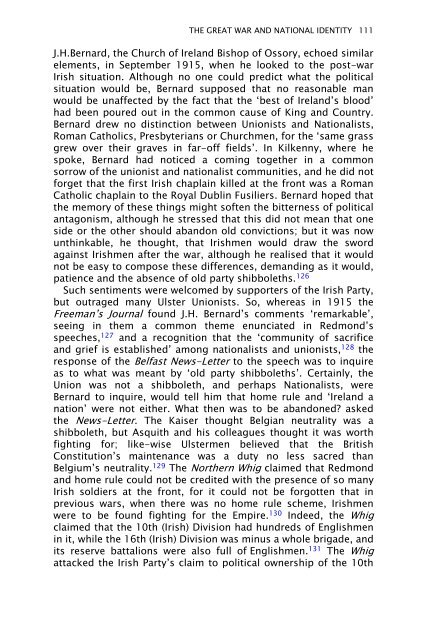Dividing Ireland: World War I and Partition
Dividing Ireland: World War I and Partition
Dividing Ireland: World War I and Partition
Create successful ePaper yourself
Turn your PDF publications into a flip-book with our unique Google optimized e-Paper software.
THE GREAT WAR AND NATIONAL IDENTITY 111<br />
J.H.Bernard, the Church of <strong>Irel<strong>and</strong></strong> Bishop of Ossory, echoed similar<br />
elements, in September 1915, when he looked to the post-war<br />
Irish situation. Although no one could predict what the political<br />
situation would be, Bernard supposed that no reasonable man<br />
would be unaffected by the fact that the ‘best of <strong>Irel<strong>and</strong></strong>’s blood’<br />
had been poured out in the common cause of King <strong>and</strong> Country.<br />
Bernard drew no distinction between Unionists <strong>and</strong> Nationalists,<br />
Roman Catholics, Presbyterians or Churchmen, for the ‘same grass<br />
grew over their graves in far-off fields’. In Kilkenny, where he<br />
spoke, Bernard had noticed a coming together in a common<br />
sorrow of the unionist <strong>and</strong> nationalist communities, <strong>and</strong> he did not<br />
forget that the first Irish chaplain killed at the front was a Roman<br />
Catholic chaplain to the Royal Dublin Fusiliers. Bernard hoped that<br />
the memory of these things might soften the bitterness of political<br />
antagonism, although he stressed that this did not mean that one<br />
side or the other should ab<strong>and</strong>on old convictions; but it was now<br />
unthinkable, he thought, that Irishmen would draw the sword<br />
against Irishmen after the war, although he realised that it would<br />
not be easy to compose these differences, dem<strong>and</strong>ing as it would,<br />
patience <strong>and</strong> the absence of old party shibboleths. 126<br />
Such sentiments were welcomed by supporters of the Irish Party,<br />
but outraged many Ulster Unionists. So, whereas in 1915 the<br />
Freeman’s Journal found J.H. Bernard’s comments ‘remarkable’,<br />
seeing in them a common theme enunciated in Redmond’s<br />
speeches, 127 <strong>and</strong> a recognition that the ‘community of sacrifice<br />
<strong>and</strong> grief is established’ among nationalists <strong>and</strong> unionists, 128 the<br />
response of the Belfast News-Letter to the speech was to inquire<br />
as to what was meant by ‘old party shibboleths’. Certainly, the<br />
Union was not a shibboleth, <strong>and</strong> perhaps Nationalists, were<br />
Bernard to inquire, would tell him that home rule <strong>and</strong> ‘<strong>Irel<strong>and</strong></strong> a<br />
nation’ were not either. What then was to be ab<strong>and</strong>oned? asked<br />
the News-Letter. The Kaiser thought Belgian neutrality was a<br />
shibboleth, but Asquith <strong>and</strong> his colleagues thought it was worth<br />
fighting for; like-wise Ulstermen believed that the British<br />
Constitution’s maintenance was a duty no less sacred than<br />
Belgium’s neutrality. 129 The Northern Whig claimed that Redmond<br />
<strong>and</strong> home rule could not be credited with the presence of so many<br />
Irish soldiers at the front, for it could not be forgotten that in<br />
previous wars, when there was no home rule scheme, Irishmen<br />
were to be found fighting for the Empire. 130 Indeed, the Whig<br />
claimed that the 10th (Irish) Division had hundreds of Englishmen<br />
in it, while the 16th (Irish) Division was minus a whole brigade, <strong>and</strong><br />
its reserve battalions were also full of Englishmen. 131 The Whig<br />
attacked the Irish Party’s claim to political ownership of the 10th








